Toast of 2017: Kyle MacLachlan shares the secrets of 'Twin Peaks: The Return'
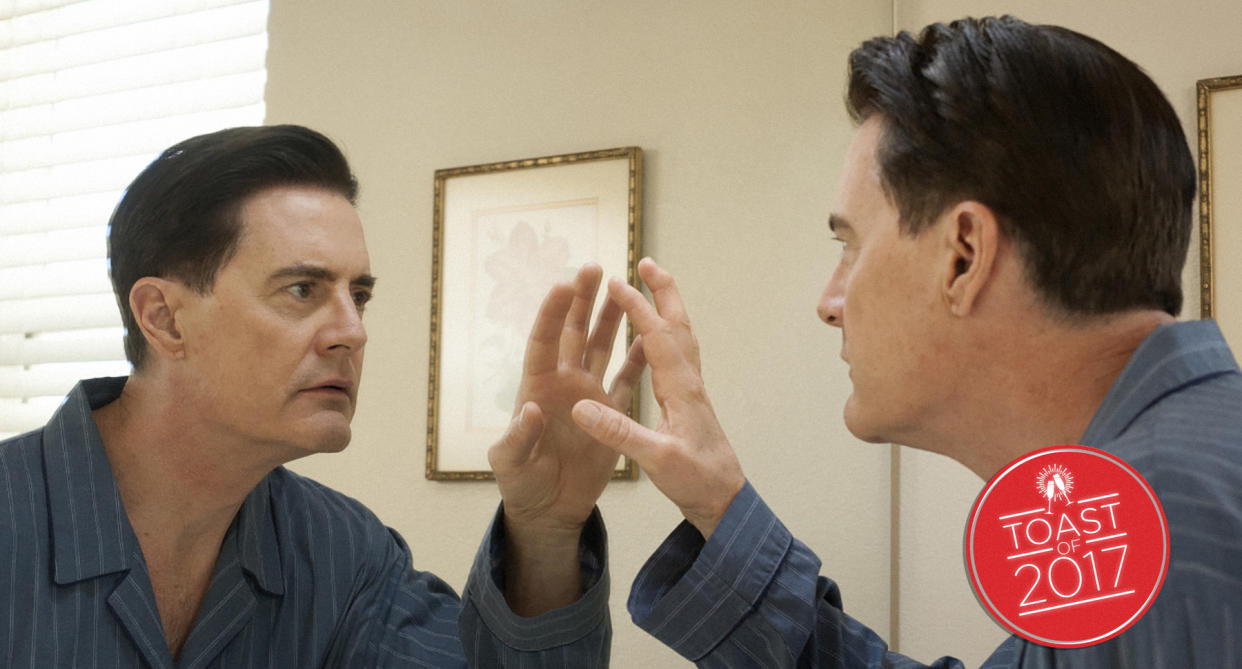
Twenty-five years after its alternately brilliant and befuddling series finale, David Lynch and Mark Frost’s singular creation, Twin Peaks, returned to television for a summertime encore that, appropriately enough, wound up raising more questions than it answered. What’s the significance of the atomic bomb imagery? What happened to Audrey? Is Carrie Page really Laura Palmer? And then there’s the most important question of all: is Twin Peaks: The Return a TV series or a movie? Although it aired weekly on Showtime in 18 hour-long installments, two prestigious film magazines — Sight & Sound and Cahiers du Cinéma — ranked the series among their best movies of 2017, setting off a firestorm of debate on Twitter. True to form, Lynch has deliberately avoided engaging in this heated discussion, although he did fan the flames early on, telling Rolling Stone prior to the show’s launch in May that that he approached The Return as an “18-hour film.”
As it turns out, Lynch’s leading man, Kyle MacLachlan, mostly agrees with his longtime collaborator on The Return‘s designation in the TV vs. film debate. “It’s tricky, because it’s a hybrid,” the actor tells Yahoo Entertainment. “David wrote it and directed it as if it were an 18-hour film, and was very specific in saying, ‘Don’t call them episodes; just call them hours.’ And at the end of an hour’s worth of viewing, he would just segue into something else, usually a performance at the Roadhouse, as a way to give it the feel of an ending. So I think the idea was that it would be viewed as one long film. But the debate is interesting! We’ll have to come up with a new category.”
While we’re in the process of inventing new categories for Twin Peaks, let’s not neglect finding fresh ways to honor MacLachlan’s performance. Besides reprising his iconic role as the coffee-and-cherry-pie-loving FBI agent Dale Cooper, the actor creates two (and maybe more) versions of his alter ego, including the Cooper who’s trapped in the otherworldly Red Room, as well as his evil doppelg?nger, who has been loose in the real world for the past quarter-century. And then there’s Doug Jones — Dougie to his friends — a Las Vegas insurance agent whose face and form is borrowed by Cooper after he exits the Red Room but before he regains full consciousness. In MacLachlan’s hands, each of these characters emerges as a distinct individual with strikingly different physicalities and personality traits. He recently received a Golden Globe nomination for his multifaceted work, but perhaps he deserves three nods, or, failing that, an entirely new statue. In a lively chat for our year-end Toast of 2017 series, he shared his theory about what the final shot of The Return, means and the strange art of playing a newborn in an adult body.
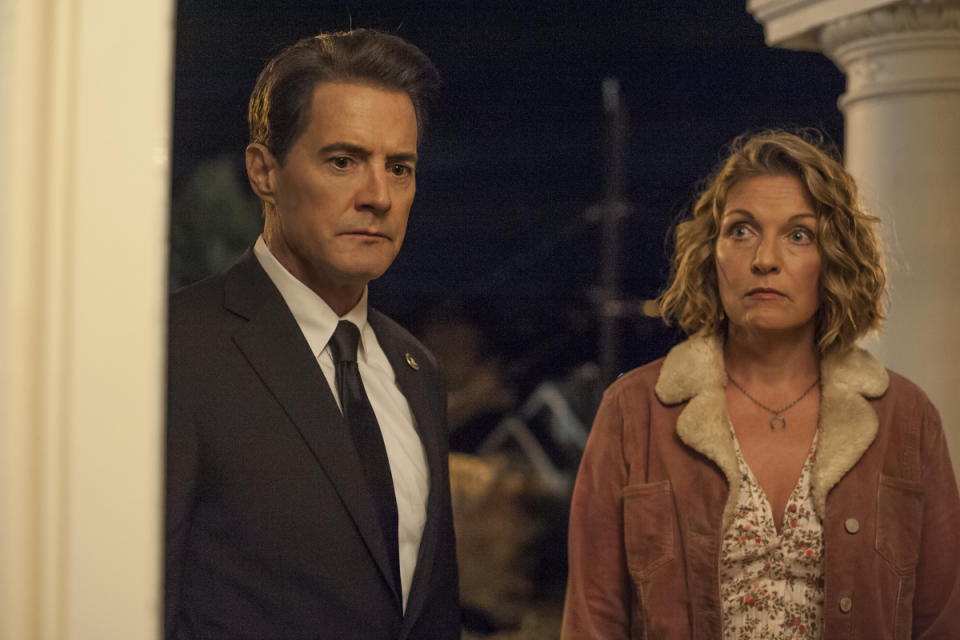
Yahoo TV: I’d like to start at the very end of Twin Peaks: The Return — specifically that haunting final scene before the credits where Cooper brings Carrie Page, the woman he thinks is Laura Palmer, back home to Twin Peaks. What went through your mind when you first read that sequence on the page?
Kyle MacLachlan: I was really moved by it. I had the same reaction to that as I had when I read the end of the original pilot. I don’t know if you recall but the very first time Twin Peaks was on air, there was a gloved hand that reaches into the frame and picks up a gold necklace, and you hear Grace [Zabriskie, who plays Laura Palmer’s mother, Sarah] screaming in the background, and there’s a quick cut. It’s very disturbing, and lifts you out of your seat. I had exactly the same thought here. We shot that scene very early on in shooting The Return; it was while we were up in Seattle, which was during the first five or six weeks of filming. We hadn’t gotten to everything else, and it’s always a bit discombobulating to play something early in the filming that’s going to be placed at the end.
David was really specific with me about how he wanted Cooper to move and look in those last few beats. And it was quite easy to react with shock when Sheryl Lee [who plays Laura and Carrie] is screaming in the middle of the night in a Seattle suburb! It made the hair on the back of my neck stand up. Also, having the owner of the house there at the door. That’s part of David’s brilliance; he enlists people that he feels have the right kind of energy. As I was playing it, I felt this slow draining of confidence. Confidence is such a part of Cooper’s DNA — it was seeping out from his pores. But one of the things about that particular Cooper is that he’s slightly different than the Dale that wakes up in the hospital; he’s another tick on the character dial away from the original Cooper. So there was a loss of control and I felt very helpless. All of those thoughts and feelings were playing in that scene, but how it was going to fit into the whole of Twin Peaks I didn’t know yet. I didn’t know what the impact was going to be, and it turned out to be very powerful.
So much of the series rests on the delayed gratification of seeing the return of the original Cooper. Were you similarly impatient to play him again?
Yeah, I did want to get back to him. During filming, I would occasionally think, “We’re really going to test the patience of our fanbase!” But I also admired the kind of commitment that David has to his vision. We never spoke about getting back to the real Cooper more quickly, but he obviously felt it was important to maintain that tension about whether he’ll come back or not. It also allowed the character of Dougie Jones to also really take hold, and I think people really began to fall in love with him. Then it became, “We love Dale Cooper, but we also love Dougie Jones. Only one or the other is probably going to survive here, and we don’t know which!” It was one of those tricky things that, in hindsight, was actually pretty great. And David was able to put a little cherry on top when Dougie returns home as a slightly more capable version of the original.
Just within our office, we had a bet going about when Cooper was going to return. At one point, I said that we weren’t going to see him until the last episode.
I do feel like Episode 16 — when Cooper arrives and everything is kind of resolved, to a point — is the end of one long beat. And then with Episode 17 and 18, you transition into something else — almost a new story and new direction. It’s a new quest, I guess, that’s sort of separate from what we’ve been watching before.
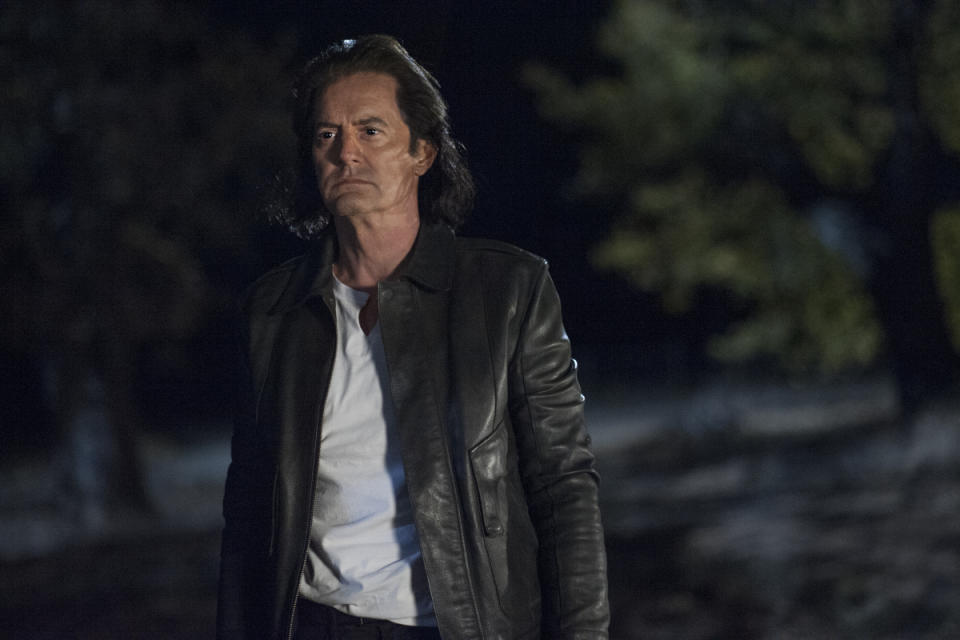
How much freedom did Lynch give you to create your different identities as Dougie, Bad Cooper, Red Room Cooper, and so on?
We found them together. Bad Cooper took a little bit of time, because David and I were approaching that character as organically as possible. There’s always the temptation to immediately say, “Oh, he’s this kind of guy, he wears this kind of stuff and he looks this kind of way,” just establish him quickly so you don’t feel the discomfort of not knowing. But every time we work together, we let the character find his way. With Bad Coop, we started with, “What is he like inside and how is that gonna be reflected in the way he moves and looks?” There were times where we wondered whether he was going to be put together and impeccably dressed, but then we let the character find his way — to the point of having dirt on his face and hands and not caring about it. There were also discussions about jewelry and other types of minutia — things that are incredibly boring to anybody not involved in creating this character but very important when you’re trying to make a character come to life from the page.
It was the same with Dougie. David knows I have a certain facility with physical comedy, and he wanted that to be magnified. So you take Cooper, and you distill him down into a new being. What is it like to be put in a body in a world where you don’t know anything? It’s almost like taking a newborn and putting it into an adult body. We had a lot of fun with the challenge of that. You have to have a lot of patience and a lot of confidence as an actor that what you’re doing is going to hold up, because there were a lot of moments where there didn’t seem to be a whole lot going on with Dougie. You just have to trust that it’s going to work; there was a big commitment to that character having that stillness.
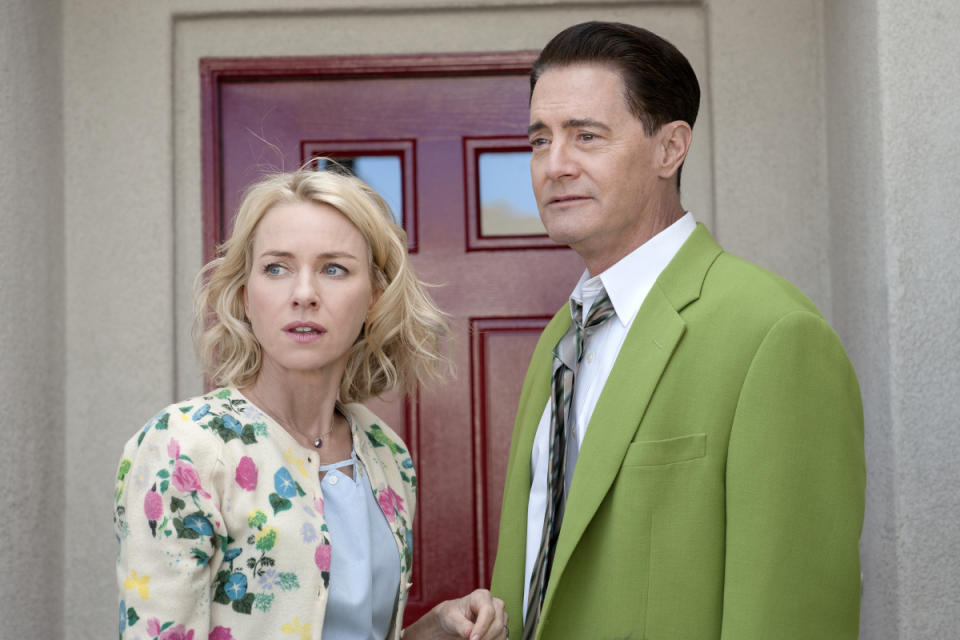
I imagine that finding Dougie’s lime-green coat was kind of a “Eureka!” moment. It’s such a brilliant costume choice that defines him in a lot of ways.
I don’t know if I had a “Eureka!” moment when I saw the coat, but I definitely thought, “This works.” It’s funny how little things lead you to where you’re supposed to be. I remember my dad had this bright yellow jacket in the ’70s, and I went to that when I saw this lime-green coat. The bright color was the perfect contrast to the super-stillness inside the character; it was like the outside and the inside didn’t have anything to do with each other. Obviously the challenge with Dougie was to approach him with no wink at the audience. He’s absolutely pure in everything he feels and does, as if it’s for the first time. I’ve got to give huge credit to Naomi [Watts, who plays Dougie’s wife, Janey-E Jones], because she had to carry all of those scenes and did an amazing job. The reality of that character is that he’s often just a reflection of the actors around that character, so she helped make Dougie believable and innately understood her role in that.
It’s wonderful to see so many of the original Twin Peaks cast back, even the actors that have since passed on, like Catherine E. Coulson, who played the Log Lady. She died in 2015; do you know when her sequences were filmed?
I don’t know exactly, but I do know that David was so grateful that he was able to get Catherine. I think that some of the story is that she was very near death, and he filmed her in the last couple of days. So what you see emanating from her is the emotion of that coming out. It’s pretty extraordinary and just so phenomenal that she was able to be a part of the show. I know that when I first heard of her passing, I thought, “Oh, what a tragedy that she won’t be able to be part of this return.” And it turns out David was already thinking ahead and was able to include her.
Because he plans ahead like that, do you have a sense of whether he’s already filing away ideas for another series after The Return?
We haven’t really spoken at length about it. He’s been out of the country for a while, so I haven’t been able to get an understanding of where we are with it. His creative process is unique to himself.
Do you have your own ideas for where Carrie and Cooper are at the end of the series? Is it an alternate reality or timeline?
I think that you’ve just said it; there’s a slight miss on their return somehow. I always felt that Cooper has taken on more than he can handle [by saving Laura]; he knew going in that it was going to be a gamble, but he had the confidence to feel like he could do it. Now he suddenly has this dilemma, but you’ve got to believe he’s got a plan. David has said repeatedly that the audience’s interpretation is the most important thing to him. From my point of view, Coop’s gotten a little bit lost in a dimension that is a tick or two away from where he’s supposed to be. But that’s just me! David and I haven’t discussed it, so he’s not said if that’s it or not. It really is open to interpretation.
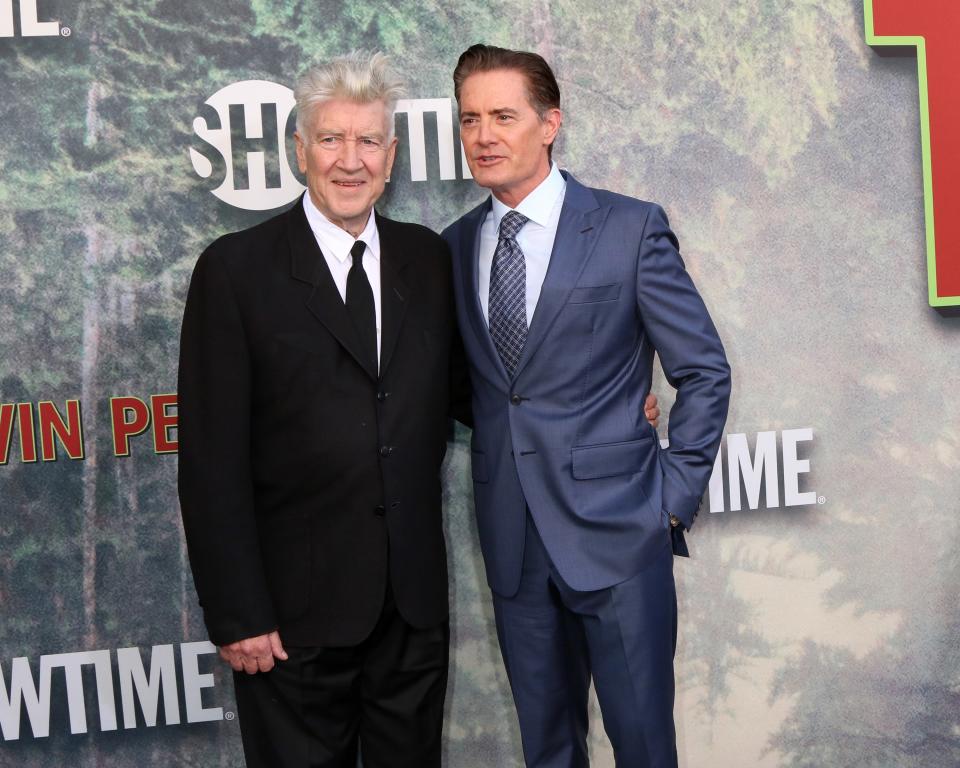
Even though you’re a much-respected character actor, it feels like The Return has been a reintroduction of sorts. Audiences seem to have come away from the series with a new appreciation for your range as a performer.
I was very excited to be able to do a different thing as an actor. That’s one of the things I pursue, and the opportunity to play not one, but three or maybe four very different characters was challenging and exciting. David knows that I’m the guy for Cooper — he can’t go and find somebody else! But if he’s going to write something where I’m going to have to do other things that he’s not necessarily seen me do before, but in his heart believes that I can do, that’s a humbling thing. I don’t know if I would have been capable of doing this 10 years ago or even 25 years ago when we first did the show. As an actor, you like to think that you’re evolving and getting better and getting better at your craft. So I feel like this was an opportunity for me to do some interesting work, and if I’m going to have to do things that I’ve not done before, there’s nobody better to do it with than David because he knows me the best and I could completely trust his eye.
You mentioned the physical comedy aspect to playing Dougie Jones earlier, and many of those scenes did remind me of silent film comedians like Charlie Chaplin.
Thank you, that’s great. I’m a big fan of Chaplin, and Harold Lloyd as well. If you go back and look at the movie The Hidden — which, geez, was in the late ’80s, I guess! — I got to do a similar kind of thing. There’s an alien that’s inhabiting a human body for the very first time in that movie. But it takes the eyes of David Lynch to give the courage to just let something run. There were a lot of times in Twin Peaks where we just rolled camera, and I did what felt right to me. Then, with the encouragement of David, I’d go even further thinking, “I’m going to trust that he’s got my back on this.” And we came up with some great stuff.
Having worked with him so long, what’s the thing about David Lynch that would surprise people the most?
That he’s got a wonderful sense of humor, terrific patience, and joy in the creative process. He’s very welcoming of an actor’s input, but at the same time very specific about what he’s looking for and what he’s not looking for. And he’s so rooted in reality and in the moment; it’s important to him that he absolutely believes that the actor is that character in that situation. There are just so many things about who he is — I could go on and on. When I look back over the years, I started with David Lynch in Dune, and then I also did my second movie with David Lynch, Blue Velvet. Being young, na?ve and callow, I think I felt, “That was good, but now I’m gonna go work with these guys over here.” That depth of appreciation [for David] that didn’t necessarily exist when I was in my early 20s has come up and out, and I love the man so much. To have worked with him as many times as I have and to have done some of my best work with him has been a big part of the journey for me as an actor.
Looking ahead to what’s after Twin Peaks, what have you taken away from the show that you hope to apply to your next role?
My process hasn’t changed much. I want to do interesting things with interesting filmmakers, and something that makes sense to me as an actor in the moment. In some ways, these performances have given me more confidence in what I’m able to do, a stronger belief in myself. And it has nothing to do with the reviews or anything like that; if I see it in my own performance, I’m comfortable with it. And I did see it in my performance in Twin Peaks. I was like, “You’ve grown, Kyle. There are things that you can do that I didn’t even know you could do.”
Twin Peaks: The Return is streaming on Showtime Anytime and on Hulu with a Showtime subscription.
Read more from Yahoo Entertainment:

